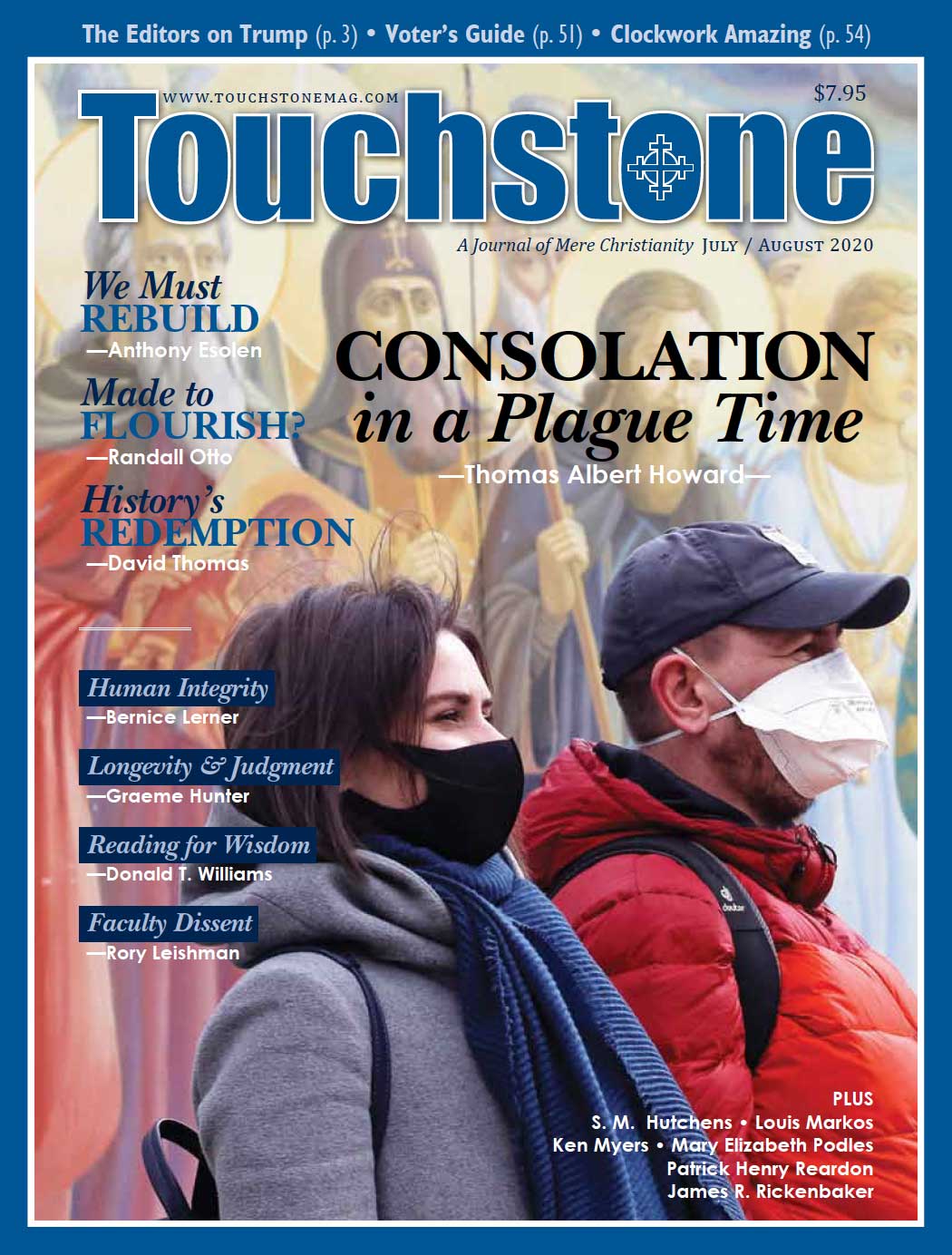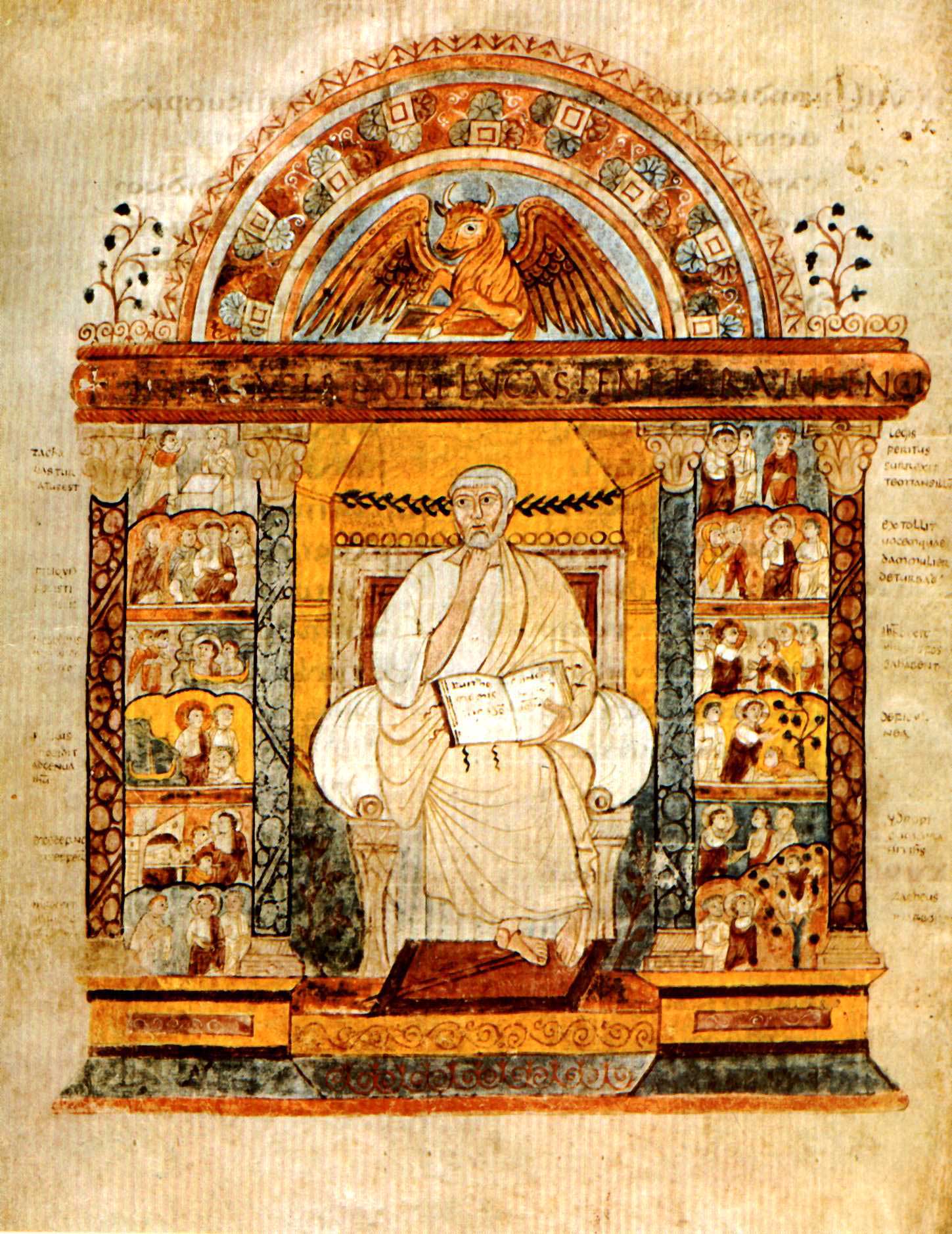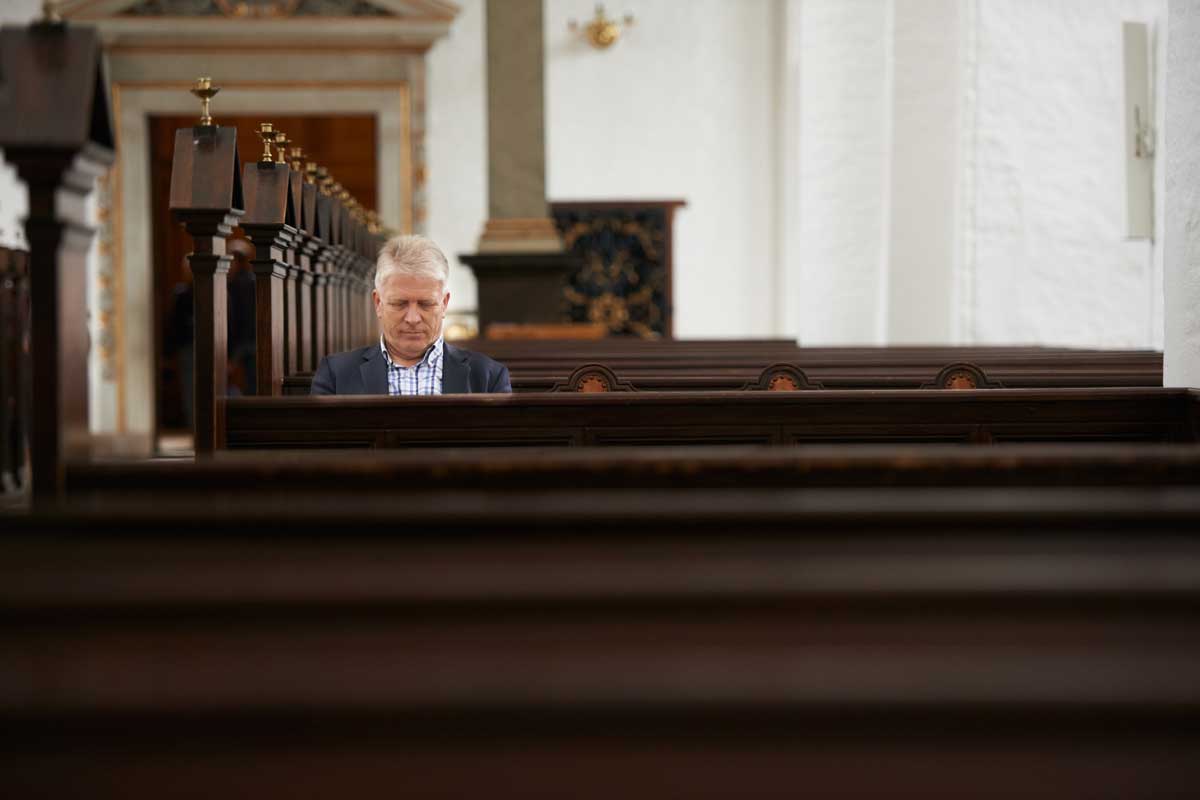Review
Human Integrity
The Restoration of Man: C. S. Lewis and the Continuing Case Against Scientism by Michael Aeschliman
reviewed by Bernice Lerner
Whenever he saw someone carrying a heavy package, my father would rush to lighten the person's load. He warmly welcomed guests, accorded people of all stations respect, and dealt honestly in business. He embodied the qualities of a mensch (the Yiddish term for a kind and decent person). Without a formal background in philosophy, he displayed sapientia—will, reason, common sense (knowing good and evil, moral obligation, justice, truth)—the unique endowment of Homo sapiens.
I could not help but think of my father when reading The Restoration of Man: C. S. Lewis and the Case Against Scientism (2019), by Dr. Michael Aeschliman. Expanding on Lewis's The Abolition of Man, in this revised edition of his much celebrated The Restitution of Man (1998), Aeschliman brings the relevant wisdom of eminent thinkers from ancient to modern times to bear on today's most pressing moral questions. He references Lewis, who had a "genius for [addressing] his arguments to the common person" and who espoused loving-kindness (the Yiddish equivalent: menschlichkeit). Preaching in 1941, in St. Mary the Virgin Church in Oxford, Lewis said, "There are no ordinary people. You have never talked to a mere mortal. . . . your neighbor is the holiest object presented to your senses."
Truth Available to All
Having studied the tenets of various faith traditions, Lewis adopted the ancient Chinese concept of the Tao—from which come "scruples of justice and humanity" and "all the practical principles from time immemorial." Among examples Lewis cites is a passage from an Ancient Egyptian text: "I have not brought misery upon my fellows. I have not made the beginning of every day laborious in the sight of him who worked for me." And from Janet, a Hindu text: "Utter not a word by which anyone could be wounded." And a passage indicating the way of Australian Aborigines: "In the Dalebura tribe a woman, a cripple from birth, was carried about by the tribe's people in turn until her death at the age of sixty-six. . . . They never desert the sick."
From within the Tao, "the reality beyond all predicates," we have, as Aeschliman reiterates, the "common reason of humanity, alive, and growing like a tree, and branching out, as the situation varies, into ever new beauties and dignities of application."
Beyond Lewis's judicious formulation, Aeschliman appreciates the Oxford don's humility. Educated in the "great central tradition" of the English moralists and of Western philosophy, Lewis, who used "outstanding passages" to craft "his own methods and arguments," believed that all human persons—cultured or not—operate on the same plane: "The work of a Beethoven and the work of a charwoman become spiritual on precisely the same condition, that of being offered to God, of being done humbly."
Aeschliman cites writers who informed or echoed Lewis's belief that "there is in the world a comprehensive and comprehensible truth . . . that accommodates itself to every level of intelligence and is thus available to all persons." Every person can display sapientia, "Godly common sense," metaphysical knowledge that distinguishes humans from other parts of the natural world—from rocks, plants, or animals. Moreover, the sane and honorable person will seek to acquire and practice moral rationality.
A Changed Landscape
What concerned Lewis, and now troubles Aeschliman, is that this supreme "mode of knowing," the "core of perennial philosophy," has dissipated in the modern era. The pitting of science and technology against religion and the humanities has changed not only the physical landscape—by means of a massive increase in the powers of technology and intensive specialization—but also "the mental and human landscape."
Seeing science as the only path to knowledge leads to seeing the human person—a holy essence, a soul—as a means and not as an ultimate end. Reducing persons to mere things destroys the very core of civil humanity, "the res publica on which law, manners, and civilization itself are built." Aeschliman cautions us against the "fashionable dogma" of scientism. Mentioning scholars who "entered the fray over this critical issue," he stresses how modern scientism, "capable of innumerable horrors," has grown, in Lewis's words, in "hideous strength." Power and pleasure without goodness and justice, "science sans conscience," negates the idea of "progress . . . [the] guarantee of moral improvement within historical time."
This past century saw perfected methods of killing the most people in the shortest amount of time. Zyklon B did the job in the gas chambers of Auschwitz. The atomic bomb laid waste Hiroshima and Nagasaki. In 1943, the German Army Ordnance Office recruited Richard Kuhn, an ardent Nazi who had won the 1938 Nobel Prize in chemistry, to study nerve gas. Presenting his newly synthesized, effective chemical weapon, Kuhn signed off, "Sieg Heil."
The Necessity of the Philosophical Realm
Quoting Lewis, who argued, "Science is a good servant but a bad master, a good method for investigating and manipulating the material world, but no method at all for deciding what to do with the knowledge and power acquired thereby," Aeschliman maintains that science needs the philosophical realm. It otherwise ignores the reality of values and meaning.
Thoughtful scientists concur. A Jewish theoretical physicist has explained how he holds both religious beliefs and scientific knowledge. Unlike science, faith can be neither proven nor disproven. One believes or one does not. His humanist colleague challenged him to consider the difference between their ethical worldviews. Pondering the matter, the physicist arrived at an answer: having the Torah ensured that ancient wisdom would be transmitted to future generations. Secular humanists had no such guide. Though awed by the beauty of mathematical formulas to illumine parts of the universe, his text-based faith lit his way.
Aeschliman observes that it is not scientists but rather "the non-professional enthusiasts of science—the propagandized intelligentsia" who are scientism's "most zealous apostles" (and susceptible to its "concomitant naturalistic reductionism"). He quotes philosopher Richard Kroner, for whom "Scientism is the vice of those who do not practice science itself but are intoxicated by the triumph of the scientific and even more of technological discoveries and devices."
While virtue is immutable, hardly a day goes by without some new scientific discovery modifying or nullifying previous certainties. Pathologists now know that macrophages—cells that help defend the body from damaging microbes—can encourage the proliferation of cancer cells. While physicians evaluate researchers' findings and possibly integrate into their practices the latest scientific understandings and treatments, sapientia requires something else: seeing in each patient "the irreducible sacredness of the human person."
One medical administrator has his busy doctors take time at the day's end to jot down what they learned from or about the patients seen that day, reminding them to prioritize human interactions. They ought also to experience awe: How did the marvelous machine that is the human body come to be? As Einstein put it, the genuine scientist "attains that humble attitude of mind toward the grandeur of reason incarnate in existence, which in its profoundest depths is inaccessible to man."
A Repository of Wisdom
The Restoration of Man urges engagement with the good and the true, the beautiful and the holy. One way to participate and exult in the metaphysical realm is to read great works. For Aeschliman, "Humane literature [provides] a precious repository of wisdom that could help people to realize their true condition and free themselves of seductive illusions." He quotes Stanley Fish, who discusses the "invitation to ascent" in Paradise Lost, which has a narrative arc "culminating in the . . . apprehension of the . . . Good and the Beautiful . . . visible only to reason, the soul's pilot."
Whether or not we are schooled in "the great central tradition" to which metaphysical poets and moral philosophers belong, we can find in our faith and culture stories that confer a "realistic sense of human possibilities and prospects, of the . . . human duality of good and evil, right and wrong, wisdom and folly, strength and weakness." We can put ourselves in another's shoes.
For those who inhabited the same time and place as my father—the Eastern European shtetl—the Bible, and Yiddish aphorisms and folklore, afforded opportunities to judge human behavior and to chart one's own way. Such wisdom shaped my father, a simple man. In Hebrew, the word for simple is tam. The biblical word tamim means "whole, intact." My father was whole, a person of integrity who acted the same in public as in private. He was a person for whom life was not easy, but for whom it was uncomplicated—he had only to do the right thing.
Aeschliman would consider this disposition to be a natural tendency of human beings, an endowment bestowed by their Creator. He quotes Matthew Arnold: "It is every person's birthright and duty to [strive to] see life steadily and see it whole."
The reader will find in The Restoration of Man a trove of insights on what it means to be fully human. Grounded in Christian thought, Aeschliman's masterly survey drives home the fact that we are all responsible for realizing our moral position as Homo sapiens. We are, in the words of C. S. Lewis, "meant to live happily and considerately and happily because considerately," in community with our fellow human beings.
Bernice Lerner , Ed.D., author of All the Horrors of War: A Jewish Girl, A British Doctor, and the Liberation of Bergen-Belsen is Senior Scholar at the Center for Character and Social Responsibility, Boston University.
subscription options
Order
Print/Online Subscription

Get six issues (one year) of Touchstone PLUS full online access including pdf downloads for only $39.95. That's only $3.34 per month!
Order
Online Only
Subscription

Get a one-year full-access subscription to the Touchstone online archives for only $19.95. That's only $1.66 per month!
bulk subscriptions
Order Touchstone subscriptions in bulk and save $10 per sub! Each subscription includes 6 issues of Touchstone plus full online access to touchstonemag.com—including archives, videos, and pdf downloads of recent issues for only $29.95 each! Great for churches or study groups.
Transactions will be processed on a secure server.
more on C. S. Lewis from the online archives
more from the online archives
calling all readers
Please Donate
"There are magazines worth reading but few worth saving . . . Touchstone is just such a magazine."
—Alice von Hildebrand
"Here we do not concede one square millimeter of territory to falsehood, folly, contemporary sentimentality, or fashion. We speak the truth, and let God be our judge. . . . Touchstone is the one committedly Christian conservative journal."
—Anthony Esolen, Touchstone senior editor













